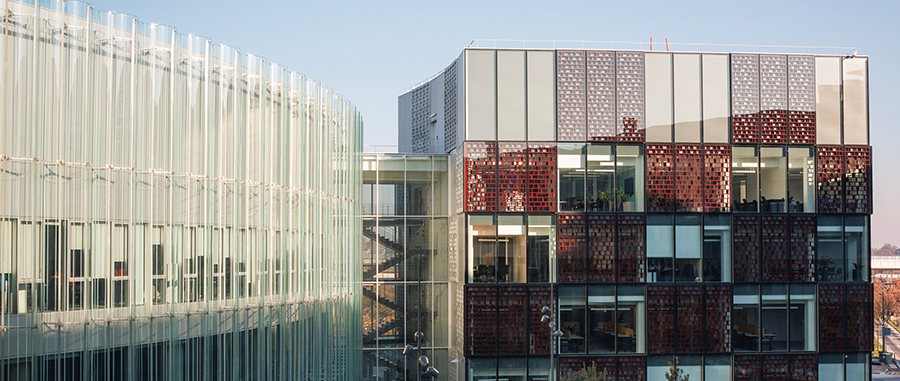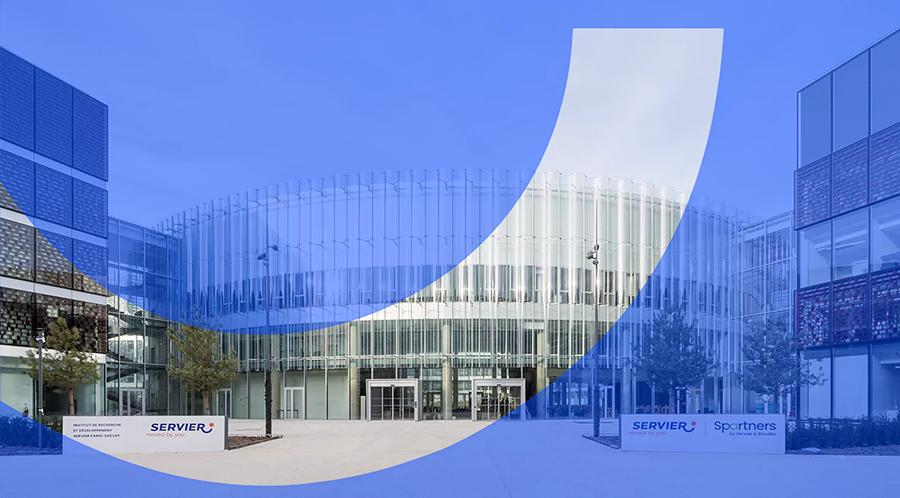We continue our series devoted to the challenges developed in our latest Integrated Annual Report (see below). After our insight on climate change, let’s take a look at the challenges of open innovation.
Today innovation can no longer be conceived within the confines of the company. Major corporations build their strength through open innovation, the ability to open themselves to the outside world and harness collective intelligence.
For many decades, companies viewed innovation as an activity to be developed away from prying eyes, conducted in the utmost secrecy. Focused on their work and advancing independently, each R&D team aspired to lead the pack in the pursuit of innovation.
In figures
Over 70
scientific partnerships and collaborations for Servier throughout the world in 2022-2023
About 70
PhD and post-doctoral students working in our R&D centers and partner laboratories across 10 countries in 2022-2023
But right at the other end of the scale, open innovation started to emerge. Introduced in 2003 by Henry Chesbrough, professor at Berkley, a more open approach to innovation has been adopted by all major corporations looking to maintain or extend their technological superiority.
Strength in numbers
Open innovation has soared in popularity, particularly in the pharmaceutical industry, as increasingly varied and specialized expertise is required to successfully innovate. Precision medicine, the major emerging challenge for pharmaceutical groups, requires in-depth understanding of a vast range of areas, including genomics, bioinformatics, data science and biotechnology.
With the emergence of new therapeutic approaches, such as biotherapies, innovative diagnostics and remote clinical trials, as well as the significant role artificial intelligence will play in the years to come, even “Big Pharma” can no longer master all the moving parts involved and develop everything internally. It has become essential to team up with start-ups, universities and laboratories.
Digital twins
Servier signed a collaboration agreement with Aitia, the market leader in the development and application of digital twins, causal AI technology and biosimulation to discover and develop new medicines. Aitia and Servier will work together on translational medicine to discover, approve and potentially develop new therapeutic targets and drug candidates for pancreatic cancer by harnessing the use of Aitia’s digital twins.
Find out more: “Partner of Choice”, major collaboration in digital twins
By engaging in open innovation, pharmaceutical companies are able to tap into a wide range of expertise outside their own scope, which supplements and expands the knowledge they are able to access in-house, providing the flexibility they need to adapt rapidly to the latest scientific and technological advances. This prevailing trend can also be observed in many other sectors such as the aeronautics and automotive industries.
Going further: Digital Twins, when AI drives progress for the pharmaceutical industry
Iconic
A compelling illustration of this new reality emerged in response to the Covid-19 pandemic. BioNTech laboratory possessed the expertise to develop highly promising mRNA vaccines, but lacked the necessary scientific and industrial resources to meet global demand. Partnering with Pfizer enabled them to rise to the challenge.
Win-win synergies
The pharmaceutical industry was an early adopter of open innovation, for reasons relating to research as well as economics. Discovering and developing new medicines is an increasingly expensive endeavor. Research takes time and failures are frequent. Indeed around 90% of drug candidates never go on to be used in medicines.
To safeguard against this reality, pharmaceutical labs join forces with biotechs and start-ups. And while open innovation enables laboratories to accelerate their research and expand innovation, it also enables smaller organizations to realize their projects by providing them with greater impact potential.

A productive forum for synergies
The incubator Spartners by Servier & Biolabs opened in the Servier R&D Institute at Paris-Saclay. It can host around 15 start-ups, representing over 100 scientists. The high-tech space enables entrepreneurs to test and develop their ideas. They enjoy complete autonomy while also taking advantage of Servier’s scientific and technological expertiser.
“Saclay represents a unique research hub, similar to the multidisciplinary campuses you find in the US, in Boston and Silicon Valley.”
Dr Claude Bertrand, Executive Vice President Research and Development, Servier
It also offers an alternative model, in which the risks inherent to the innovation process are shared, as are the profits when developments succeed. Emulation is replacing competition, and this approach benefits all, especially patients.
View from the field: “We are revolutionizing the way eye conditions are treated.”
Meeting with Fabien Dorange / Director of Analytical Science, SparingVision. In this picture, Fabien is in his office at Spartners, the health care start-up incubator within our Servier R&D Institute at Paris-Saclay.
“We are a clinical-stage genomic medicines company leading a step shift in how ocular diseases are treated. We moved into the Spartners incubator in October 2023, and the support (logistics, procurement, authorizations, equipment training and storage) from the teams at Biolabs and Servier meant we were able to conduct our first experiments very soon after. We are already reaping the benefits from the equipment and infrastructure here. Right from the word go, interactions with the Servier platforms and experts will enable us to pick up the pace of progress on our projects.”

In a constantly changing world, Servier is adapting and flourishing. Our Integrated Annual Report 2022-2023 showcases this evolution, demonstrating how our company is responding in concrete ways to contemporary societal challenges.
Our Integrated Annual Report 2022-2023 is much more than a corporate document: it’s an invitation to explore our story, achievements and aspirations, in a concise and attractive format.
